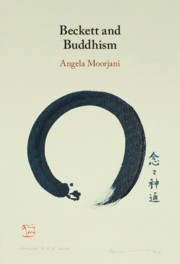Book contents
- Beckett and Buddhism
- Beckett and Buddhism
- Copyright page
- Dedication
- Contents
- Figures
- Acknowledgments
- Abbreviations of Editions Used
- Introduction
- Chapter 1 Schopenhauer’s Buddhism Revisited: Recent Archival Evidence
- Chapter 2 East–West Dialogue via Schopenhauer
- Chapter 3 Buddhist and Mystic Threads in the Early Fiction
- Chapter 4 Beckett’s Paradoxical Logic through Buddhist and Western Lenses
- Chapter 5 The Coincidence of Contraries and Noh Drama
- Chapter 6 The No-Self Staged and Voices from Elsewhere
- Chapter 7 Rebirth and the Buddhist Unborn in the Fiction and Drama
- Chapter 8 Dreaming ‘all away’ in the Final Texts
- References
- Index
Chapter 2 - East–West Dialogue via Schopenhauer
Published online by Cambridge University Press: 08 July 2021
- Beckett and Buddhism
- Beckett and Buddhism
- Copyright page
- Dedication
- Contents
- Figures
- Acknowledgments
- Abbreviations of Editions Used
- Introduction
- Chapter 1 Schopenhauer’s Buddhism Revisited: Recent Archival Evidence
- Chapter 2 East–West Dialogue via Schopenhauer
- Chapter 3 Buddhist and Mystic Threads in the Early Fiction
- Chapter 4 Beckett’s Paradoxical Logic through Buddhist and Western Lenses
- Chapter 5 The Coincidence of Contraries and Noh Drama
- Chapter 6 The No-Self Staged and Voices from Elsewhere
- Chapter 7 Rebirth and the Buddhist Unborn in the Fiction and Drama
- Chapter 8 Dreaming ‘all away’ in the Final Texts
- References
- Index
Summary
The second chapter explores in more detail the Buddhist concepts relayed by Schopenhauer cycling through Western culture in the late nineteenth and early twentieth century. Focusing on the Beckett of the 1930s and writers and artists with whom he was conversant, the chapter chronicles what their works owe to the Buddha and Schopenhauer’s teachings. Subsequent sections probe the analogies that are evident for Schopenhauer between Eastern and Western mysticism – the Buddha and Meister Eckhart’s teachings in particular – resulting in Beckett’s allusions throughout his oeuvre, over six decades, to both Buddhist and Christian Neoplatonic thought. The Buddha and Schopenhauer’s two-world view of the empirical and the metaphysical serves to interrogate nihilistic interpretations of the Buddhist absolute and to focus closely on Schopenhauer’s rescue of nirvāṇa from such misreadings. A short disquisition on the unknowable and silence, values Beckett shared with Eastern and Western thinkers, concludes this chapter.
Keywords
- Type
- Chapter
- Information
- Beckett and Buddhism , pp. 38 - 63Publisher: Cambridge University PressPrint publication year: 2021



